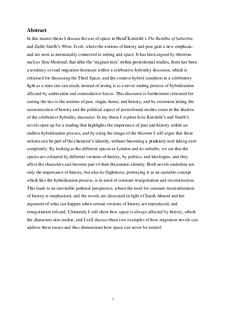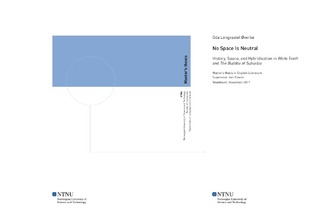| dc.description.abstract | In this master thesis I discuss the use of space in Hanif Kureishi’s The Buddha of Suburbia and Zadie Smith’s White Teeth, where the notions of history and past gain a new emphasis, and are seen as intrinsically connected to setting and space. It has been argued by theorists such as Sten Moslund, that after the ‘migrant turn’ within postcolonial studies, there has been a tendency to read migration literature within a celebrative hybridity discourse, which is criticised for discussing the Third Space, and the creative hybrid condition in a celebratory light as a state one can reach, instead of seeing it as a never-ending process of hybridisation affected by ambivalent and contradictive forces. This discourse is furthermore criticised for cutting the ties to the notions of past, origin, home, and history, and by extension letting the reconstruction of history and the political aspect of postcolonial studies come in the shadow of the celebrative hybridity discourse. In my thesis I explore how Kureishi’s and Smith’s novels open up for a reading that highlights the importance of past and history within an endless hybridisation process, and by using the image of the rhizome I will argue that these notions can be part of the character’s identity, without becoming a predatory root taking over completely. By looking at the different spaces in London and its suburbs, we see that the spaces are coloured by different versions of history, by politics, and ideologies, and they affect the characters and become part of their rhizomatic identity. Both novels underline not only the importance of history, but also its flightiness, portraying it as an unstable concept which like the hybridisation process, is in need of constant renegotiation and reconstruction. This leads to an inevitable political perspective, where the need for constant reconsideration of history is emphasised, and the novels are discussed in light of Sarah Ahmed and her argument of what can happen when certain versions of history are reproduced, and renegotiation refused. Ultimately I will show how space is always affected by history, which the characters also realise, and I will discuss these two examples of how migration novels can address these issues and thus demonstrate how space can never be neutral. | nb_NO |

